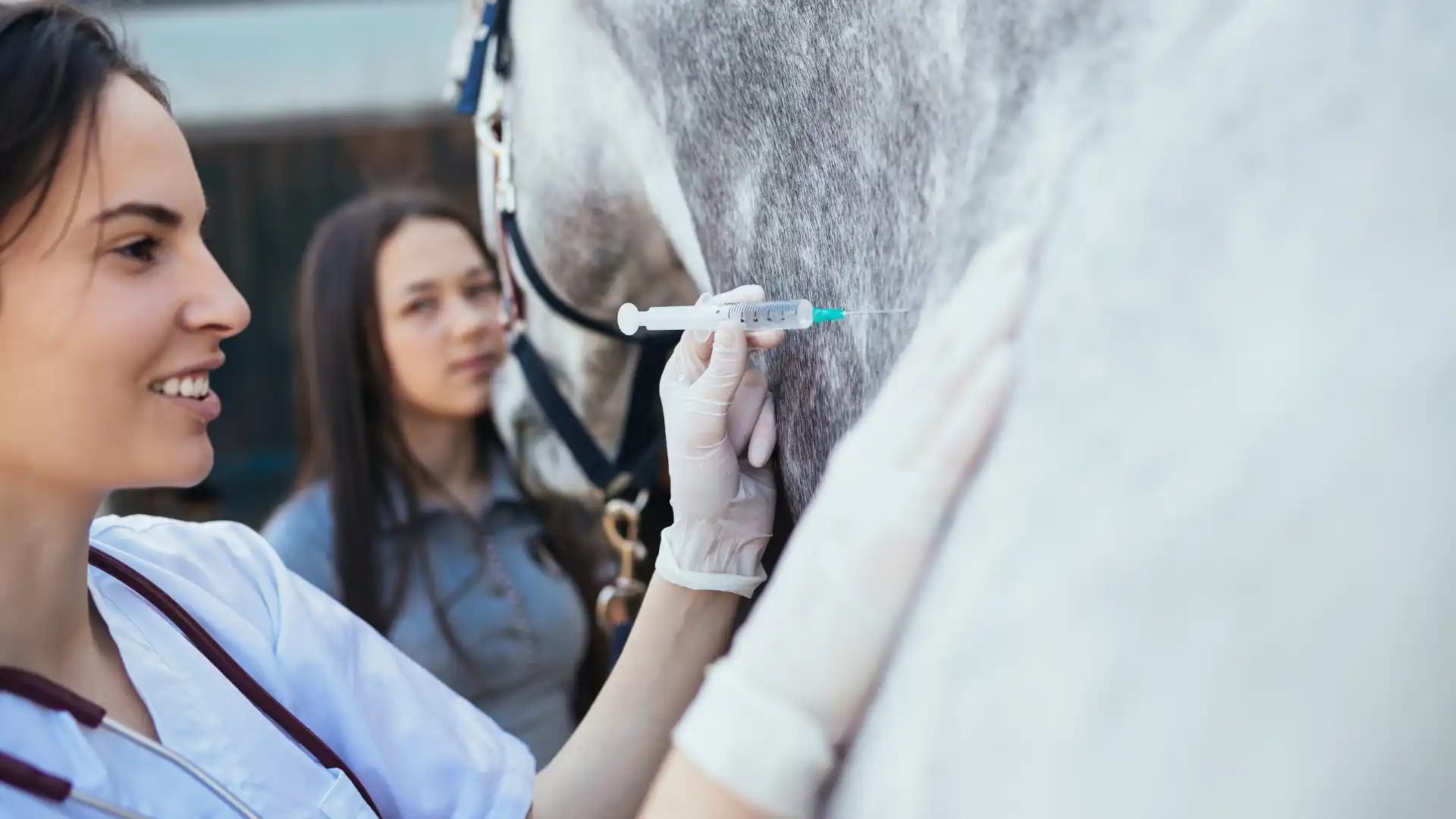
Equine Influenza: Symptoms, Protection & Vaccination Costs
Equine influenza, also known as horse flu, is a highly contagious viral respiratory disease that can spread rapidly through entire stables or competition grounds. While most horses recover with proper care, the illness can lead to serious complications if left untreated or if training resumes too early. In this article, you’ll learn how to recognize the symptoms, understand the risks, and protect your horse through vaccination — including costs and practical prevention strategies.
Table of Contents
What Is Equine Influenza?
Equine influenza, also known as horse flu, is an acute viral infection of the respiratory tract caused by influenza viruses A/equi-1 or A/equi-2. It is one of the most highly contagious equine diseases — a single infected horse can trigger an outbreak that spreads through entire barns or competition venues within just a few days.
Transmission occurs mainly through the air, via droplets from coughing or sneezing. A particular risk: horses are already contagious before showing clinical symptoms.
How to Recognize Equine Influenza
Typical symptoms of equine influenza include:
- Sudden, high fever (above 39 °C / 102.2 °F)
- Dry, harsh cough
- Watery to mucous nasal discharge
- Fatigue, loss of appetite
- Muscle stiffness and possible lameness
- In foals and older horses: risk of secondary pneumonia
The illness usually lasts 7–14 days, but recovery may take longer without adequate rest. Complications such as chronic respiratory disease are not uncommon.
How Dangerous Is Equine Influenza?
If left untreated or if training is resumed too early, equine influenza can lead to:
- Long-term lung damage
- Chronic coughing
- Reduced performance
- High risk of bacterial secondary infections
Horses most at risk are:
- Unvaccinated horses
- Foals with insufficient immune protection
- Horses frequently exposed to others (competitions, auctions, stable changes)
Treatment of Equine Influenza
Because equine influenza is a viral infection, there is no specific antiviral treatment. Management focuses on supportive care:
- Strict rest and stall confinement (at least 2 weeks, preferably longer)
- Fever-reducing medication as prescribed by a veterinarian
- Inhalation therapy to loosen mucus
- Antibiotics only if secondary bacterial infections occur
Equally important: stable quarantine to prevent further spread. Outbreaks must be reported to the veterinary authorities if multiple horses are affected.
How Often Should Horses Be Vaccinated Against Influenza?
Vaccination is the most effective preventive measure. According to STIKO Vet and FN guidelines:
- Competition horses: every 6 months
- Leisure horses: every 12 months
For competition horses, vaccination is mandatory under LPO §66. Horses without valid vaccination records are not permitted to compete.
Basic Immunization in Foals
Foal vaccination begins at around 6 months of age, once maternal antibodies no longer interfere. The protocol is:
- First vaccination
- Second vaccination after 4–6 weeks
- Third vaccination after 6 months
Afterward, booster shots follow at the recommended intervals.
What Does Equine Influenza Vaccination Cost?
The cost of equine influenza vaccination varies depending on the veterinary practice and region. On average, horse owners can expect the following price range:
Money-Saving Tip: Join group vaccination appointments at your stable or ask your vet about discounts for combined vaccines.
Combined Tetanus and Influenza Vaccination for Horses
Many veterinarians offer a combined tetanus and influenza vaccination for horses. It protects against two serious diseases at once and reduces:
- Overall vaccination costs
- Stress for the horse
- Time and scheduling effort for the owner
This combined vaccination is especially popular with leisure horses, particularly in barns where several horses are vaccinated at the same time.
How Much Does a Combined Tetanus–Influenza Vaccination Cost?
On average, the combined tetanus–influenza vaccine costs €40–70. This makes it more affordable than two separate vaccinations.
Some veterinary practices also offer tiered pricing or special vaccination days with reduced fees.
How Long Does Equine Influenza Vaccination Protect?
- Competition horses: approx. 6 months
- Leisure horses: approx. 12 months
- Foals after basic immunization: booster every 6–12 months (STIKO Vet guidelines)
Protection is not lifelong. Regular boosters are necessary because influenza viruses mutate and immune defense decreases over time.
Side Effects of Equine Influenza Vaccination
Modern vaccines are very well tolerated. Possible but rare side effects include:
- Mild swelling at the injection site
- Temporary fever
- Fatigue or reduced appetite for 1–2 days
Serious complications are extremely rare, usually affecting horses with pre-existing conditions or those under significant stress.
FAQ – Equine Influenza and Vaccination
How often should horses be vaccinated against influenza?
Competition horses: every 6 months.
Leisure horses: annually.
Young horses: according to STIKO Vet after basic immunization.
How much does an influenza vaccination cost?
Between €30–50.
As a combined tetanus–influenza vaccination: €40–70.
How dangerous is influenza in horses?
Very dangerous. It spreads rapidly and can cause severe respiratory illness.
What are typical symptoms?
Fever, dry cough, nasal discharge, fatigue. Complications may include pneumonia.
How long does recovery take?
At least 2 weeks, and in severe cases, several months — depending on rest and aftercare.

